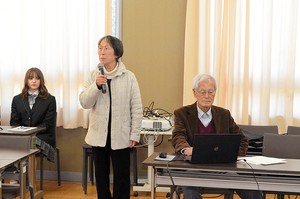By AYAKO TSUKIDATE/ Staff Writer
December 23, 2020 at 17:55 JST
 Nurses treat a COVID-19 patient with serious symptoms on Dec. 11. (Provided by Kindai University Hospital)
Nurses treat a COVID-19 patient with serious symptoms on Dec. 11. (Provided by Kindai University Hospital)
Nurses have quit their jobs at 21 percent of hospitals that accept COVID-19 patients mainly because of changing labor conditions, infection risks and discrimination stemming from their work, a survey showed Dec. 22.
“The biggest wave of COVID-19 is raging now, so the mental and physical fatigue is reaching a peak among nurses,” said Toshiko Fukui, head of the Japanese Nursing Association (JNA), which conducted the survey.
The survey covered nursing directors at 8,300 hospitals across the nation in September, as well as 38,000 nurses. The JNA received valid responses from 2,765 hospitals, or 34 percent of the total contacted.
Of them, 1,138, or 41 percent, were hospitals that accept COVID-19 patients, including designated medical institutions for infectious diseases, while 1,627, or 59 percent, did not accept COVID-19 patients.
Fifteen percent of all hospitals said their nurses quit because of changes in their work, such as transfers, or the risk of being infected with the novel coronavirus.
The ratio was 21.3 percent among hospitals that treat COVID-19 patients.
Among the nurses who responded to the survey, 57.0 percent said they have dealt with cases related to COVID-19.
After the first wave of novel coronavirus infections started around spring, 21 percent of the nurses said they suffered from discrimination or prejudice because of their proximity to the virus.
Of them, 28 percent said their family members or relatives were insulted by others, while 20 percent said they were harassed by patients.
Eight percent of the nurses said family members or relatives were asked not to come to work by their employers.
Fifteen percent of the nurses who said that they suffered discrimination or prejudice said they wanted a job other than nursing, while 14 percent said they do not want to work in any field.
Fukui said she is highly concerned that more nurses will leave their jobs at the end of the year, when many medical institutions are closed for the holidays.
“Nurses work hard with a sense of responsibility, but they are reaching their limit,” Fukui said. “The best support for nurses is for people not to get infected. Please comply with anti-coronavirus measures as strictly as possible.”




















A peek through the music industry’s curtain at the producers who harnessed social media to help their idols go global.
A series based on diplomatic documents declassified by Japan’s Foreign Ministry
Here is a collection of first-hand accounts by “hibakusha” atomic bomb survivors.
Cooking experts, chefs and others involved in the field of food introduce their special recipes intertwined with their paths in life.
A series about Japanese-Americans and their memories of World War II